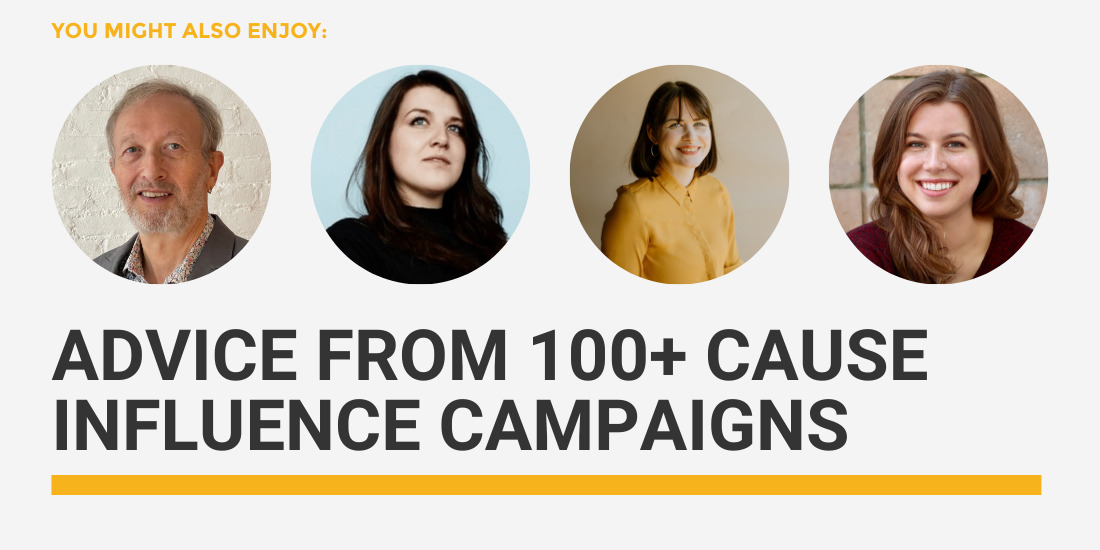If you’re an influencer—whether a celebrity, social media creator, athlete, musician, actor, or other public figure—you’re familiar with multiple requests to endorse or engage with nonprofits and philanthropic causes. Often, receiving these requests can be exciting, especially if you’re interested in using your platform to make an impact. But, before you give your support, it’s crucial to carefully evaluate an organization and understand its culture, reputation, and overall
impact to ensure it’s a good match.
Here are three essential tips for influencers and their management teams to consider as guidelines for nonprofit partnerships so they have a better chance of entering into social good partnerships that are meaningful, impactful, and, of course, mutually beneficial.
Choose Non-profit Causes That Resonate With Your Passions
A solid partnership starts with an authentic connection. Before using your platform to support any nonprofit, ensure the organization’s mission or cause resonates with you. A nonprofit can have an outstanding reputation, but it’s probably not a good fit for either party if you aren’t fully aligned with its mission.
When facilitating partnerships between influencers and nonprofits, consider things like:
- Personal interests: Does the mission connect to you beyond your interest in doing good? Model and entrepreneur Karly Kloss learned to code and used this experience to encourage girls to take up coding by founding Kode With Karly.
- Life experiences: Does the work relate to any of your personal experiences? For example, Usher’s son has type 1 diabetes, so our “Diabetes Dance Dare” campaign for the American Diabetes Association was appropriate for him to support.
- Level of comfort: Are you comfortable with the organization’s messaging? Would you feel confident speaking about it? Due diligence, such as online reputational searches, is essential, as is employing the front page test. If you and your potential nonprofit partner’s association ended up on the front page of a national or local newspaper, would you be happy or embarrassed? If the latter, move on and find a new partner.
Starting with these criteria will help you and your talent team evaluate whether it’s right for you to explore a nonprofit’s request for support.
Research An Organization’s Reputation And Quality
In a time when media, fans, and critics constantly observe public figures; actions, it’s crucial to align yourself with organizations with a good reputation and a positive reflection of your values. Nonprofits are not all created equal, as, unfortunately, many influencers and their teams have learned this the hard way.
In 2011, Hilary Swank was criticized for a paid appearance at the birthday party of Chechen leader Ramzan Kadyrov, an authoritarian president accused of sanctioning human rights abuses. She denied knowing about the allegations, apologized, and donated her fee to charity, but it was still undoubtably embarrassing and damaging to her reputation. The whole thing could have been avoided if her (ex) management team had done basic research beforehand.
So, how can you be sure the organizations you’re vetting for your social good partnership are up to your standards? Here are a few things to consider:
- Is the nonprofit financially sound and well-established in its field?
- Does the organization have a proven track record? Does its social impact report show a positive Social Return On investment?
- If the nonprofit is local to a specific area, does it have a good reputation in its community? If larger, is it well-regarded by the general public?
- Generally, does the organization’s online presence and messaging appear reputable and legitimate?
- Has the organization received support from other public figures with positive outcomes? It’s important to remember that there can always be some risk when publicly supporting any organization. Answering these questions will help you better evaluate a nonprofit so you can feel confident about your decision.
Make Time To Have A Dialogue With The Organization
One of the best ways to learn about an organization is to speak with its leadership or clients directly. Establishing a personal connection with a nonprofit’s team can give you a better sense of what a partnership will be like and help you gain insights that aren’t readily apparent from
online research. If you are a fan of the work of the non-profit, then a long-term relationship, rather than a one-and-done, can be incredibly rewarding. A wonderful example is Angelina Jolie who has worked consistently with the United Nations High Commission for Refugees for over 20 years.
Check out these nonprofit characteristics from conversations with their team:
- Organizational culture: Understanding how a nonprofit team communicates and approaches challenges will help you discern whether your values align beyond the mission statement on their website. Every organization faces hurdles and tough days, but an overall positive culture indicates a successful partnership.
- Dedication to the work: In-person or virtual meetings allow you to witness firsthand a nonprofit team’s passion and dedication for their work. Use this as an opportunity to ask about current projects they’re working on, future goals, and ways they see you contributing to that work.
- Responsiveness and transparency: While nonprofit teams often have much on their plate, you can still expect some level of communication and accountability. If they’re disorganized, unresponsive, or uninterested, it’s likely not a good fit. I learned the hard way when, nearly a decade ago, one nonprofit I worked with arranged a car to take an
influencer to an event but reneged at the last minute. I paid for the car, and the resultant media value from the Influencer engagement was well over $10,000. Neither I nor the Influencer worked with that nonprofit again, and I later found out that several former employees and outside agencies shared my negative experience. That lesson taught me to do my due diligence beforehand.
Ideally, I suggest influencers and their management teams have a few conversations with an organization’s leadership and other staffers before committing to a long-term partnership.
Set yourself up for a successful social good partnership
Social good partnerships with nonprofit organizations can be a rewarding experience for public figures. By carefully vetting nonprofits based on the tips in this blog, influencers can ensure that their support goes to well-established, reputable organizations that align with their values.
Ultimately, this will create a collaboration poised for meaningful impact where the Influencer’s equity, reputation, resources, and time are well spent.
Want more tips on influencer marketing? Click here to get an excerpt of my book, and visit my resources page for free tools to help your campaign be more successful.
This article was written by Paul Katz.






